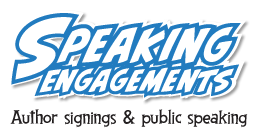You don’t need a subscription to read today’s post!
This is a re-post from the Webcomics.com archive. If you’ve ever been curious about the kind of information, tutorials and advice that you’ll get as part of your subscription to Webcomics.com, this is a good example.
If you’d like to join the site, you can get a 12-month subscription for $30 — or you can get a one-month Trial for $5 … with no obligation after your 30 days expire. For less than three bucks a month, you can get a steady flow of information, tutorials and advice targeted towards your webcomic business — plus a private forum to discuss issues with other professionally minded cartoonists.
Let me tell you why I love the UPS Store.
They made my life easier. And they’re saving me hundreds. Hundreds.
 I’ve been shipping books to Diamond Comics Distribution, and it’s a huge pain. (That’s not a reflection on Diamond, of course.) Shipping large quantities of anything to anywhere is expensive as heck these days. And for any shipment over 500 pounds, Diamond makes the request that the books are strapped to a pallet (pictured to the right). That’s a couple hours of work to do it correctly.
I’ve been shipping books to Diamond Comics Distribution, and it’s a huge pain. (That’s not a reflection on Diamond, of course.) Shipping large quantities of anything to anywhere is expensive as heck these days. And for any shipment over 500 pounds, Diamond makes the request that the books are strapped to a pallet (pictured to the right). That’s a couple hours of work to do it correctly.
Then you have to arrange for a freight company to pick up the pallet and deliver it to the appointed address. Unless you’re fortunate enough to live or work in a building with a trucking dock, that’s going to mean spending the extra money to have the driver bring a pallet jack on a truck with a lift gate.
ka-CHING.
When it rains, you’re poor
Last year, I shipped a 900-pound shipment of books to Diamond, and all of the variables listed above applied.
The total for the shipment clocked in at well over $1,000. I have to check my records, but offhand, I remember it was close to $1,300.
 And the palletting process? I work in a studio inside a rehabbed old factory building. But I wasn’t able to access the truck bays that month due to some other residents who had priority. That left me building my pallet in the parking lot, under a canopy my wife had bought for camping, hoping the rain in the forecast was going to hold off.
And the palletting process? I work in a studio inside a rehabbed old factory building. But I wasn’t able to access the truck bays that month due to some other residents who had priority. That left me building my pallet in the parking lot, under a canopy my wife had bought for camping, hoping the rain in the forecast was going to hold off.
It took me hours to lug the boxes out to the parking lot, stack them, make sure each was labeled correctly, and then secure them to the pallet with plastic wrap.
And then the driver was late. Our 11 a.m. pick-up had turned into 6 p.m. He missed it by seven freaking hours.
When I called to bellow at the dispatcher, I was told that I should have never expected him to be there at 11 in the morning. That was just crazy on my part.
And even though I had submitted payment information while I was setting up the shipment, one month later, I was hit with a notice of delinquent payment.
Here we go again
So as happy as I was to hear that Diamond had sold out of that particular title, I wasn’t exactly looking forward to shipping them more stock — to the tune of a 500 pound shipment.
Like a man being walked to the firing squad, I took myself to the labyrinth-like Web site for UPS Freight. And after filling out digital forms for the better part of an hour, received a message that said that my shipment couldn’t be scheduled.
Great. That means a trip into the oxymoron-ridden world of Customer Service.
I dialed the phone.
Several days later (that’s not an exaggeration) I got a call back:
“Listen, bud. Why don’t you just take your books down to the UPS Store?”
“You expect me to drive five hundred pounds of books to downtown Philadelphia?!”
“Nah. They’ll pick them up.”
“Bullshit.”
He insisted that he wasn’t pulling my leg. So I wearily called the UPS Store at 17th and Market. Dave answered. Dave and I have become close friends.
“Oh, sure, we’re doing more and more of this. I’ll send a couple guys out with the van. They’ll bring the books over here. We’ll pallet them up, and get ’em out the door. No problem.”
No bullshit.
And they did exactly that. They drove out to the studio and picked up the boxes. If there was a charge, I don’t see it on my receipt.
Oh. The receipt.
You ready for this? $370.10.
• $270.10 for the shipping.
• $100 for the palleting.
Now this was about half of the previous shipment (which was over $1k), so I was expecting this to start at five hundy.
Just for the sake of comparison, I shipped 11 individual boxes, 30 pounds each, to the same location to fill a separate Purchase Order. That cost me $334 (for about 330 pounds).
And did I mention they picked up the boxes at my studio and secured them onto a pallet? For a measly hundred smackers? How about I tell you that this was the day after Christmas. And it was “no problem… happy to be able to help out.”
I love the UPS Store.






























